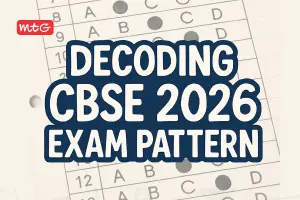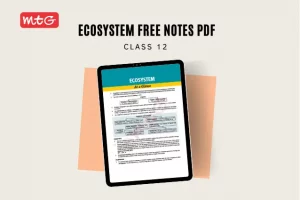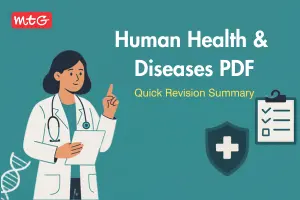Ecosystem Class 12 Biology MCQ with Answers has been organized according to the latest exam pattern in the CBSE Class 12 Biology syllabus for the upcoming CBSE Class 12 Biology Exam. Ecosystem cover topics like ecosystem – structures and functions, These questions are designed to help students understand the concept thoroughly. They are helpful for revision and for grasping the concepts effectively. These MCQ questions cover in-text book questions and important topics to help students assess their preparation level for CBSE board exams.
Recent – Organisms and Populations Class 12 Biology MCQ With Solutions
Important – Ecosystem Class 12 Notes PDF | Quick Revision for CBSE Biology
CBSE Class 12 Chapter 12 Ecosystem MCQs
Check below the MCQ Questions for class 12 Biology with answers and Clear your idea of Chapter 12 Ecosystem.
Q.1. The ecological pyramids that can never be inverted in
(a) pyramids of dry biomass
(b) pyramids of energy
(c) pyramids of biomass
(d) pyramids of number.
Answer
Check Out – 11 Most Important Graphics of NCERT Class 12th Biology That You Cannot Miss
Q.2. In an ecosystem energy enters through
(a) herbivores (b) carnivores
(c) producers (d) decomposers.
Answer
Practice More – CBSE Sample Paper Class 12 for 2023-24 Boards | FREE PDF from MTG
Q.3. Only 10% energy is transferred from a trophic level to the next trophic level was proposed by
(a) Lindeman (b) Tansley
(c) Stanley (d) Weismann
Answer
(a): The ten percent law of transfer of energy from one trophic level to the next was introduced by Raymond Lindeman. According to this law, during the transfer of energy from organic food from one trophic level to the next, only about ten percent of energy from the organic matter is stored. The remaining is lost during the transfer, broken down in respiration, or lost to incomplete digestion by higher trophic level.
Q.4. Which of the following statements regarding energy flow are false?
I. The detritus food chain begins with dead organic matter.
II. In aquatic ecosystem, detritus food chain is the major conduit for energy flow.
III. In terrestrial ecosystem a larger fraction of energy flows through grazing food chain.
IV. Producers belong to the first trophic level of the food chain.
(a) II and III only (b) III and IV only
(c) I and II only (d) I, II and III only
Answer
Q.5. The average price tag on ecosystem services determined by Robert Constanza and his colleagues was
(a) 3 trillion USD (b) 13 trillion USD
(c) 23 trillion USD (d) 33 trillion USD.
Answer
Q.6. The direction of energy flow is
(a) producers → carnivores → herbivores → decomposers
(b) producers → herbivores → decomposers → omnivores
(c) producers → herbivores → carnivores → decomposers
(d) producers → carnivores → herbivores → decomposers.
Answer
Q.7. In a food chain the peacock eats a snake which is fed upon frog. The frog eats insect while insect eats green plant. The position of peacock in food chain is
(a) primary producer (b) secondary producer
(c) at the top of apex (d) tertiary consumer.
Answer
Q.8. The amount of nutrients, such as carbon, nitrogen,phosphorus and calcium present in the soil at any given time, is referred as
(a) standing crop (b) climax
(c) climax community (d) standing state.
Answer
Q.9. In the equation, GPP – R = NPP, R represents
(a) respiration losses (b) radiant energy
(c) retardation factor (d) environment factor.
Answer
Q.10. Which of the following statements is not correct ?
(a) Pyramid of numbers in a grassland ecosystem is upright.
(b) Pyramid of biomass in sea is generally inverted.
(c) Pyramid of biomass in sea is generally upright.
(d) Pyramid of energy is always upright.
Answer
We hope the MCQs for the CBSE Class 12 Biology Chapter 12 on Ecosystem are helpful for your board exam preparation.
Keep learning and stay updated with us for more CBSE exam updates.
Important – Human Health & Diseases For Class 12 PDF | Quick Revision Summary






























